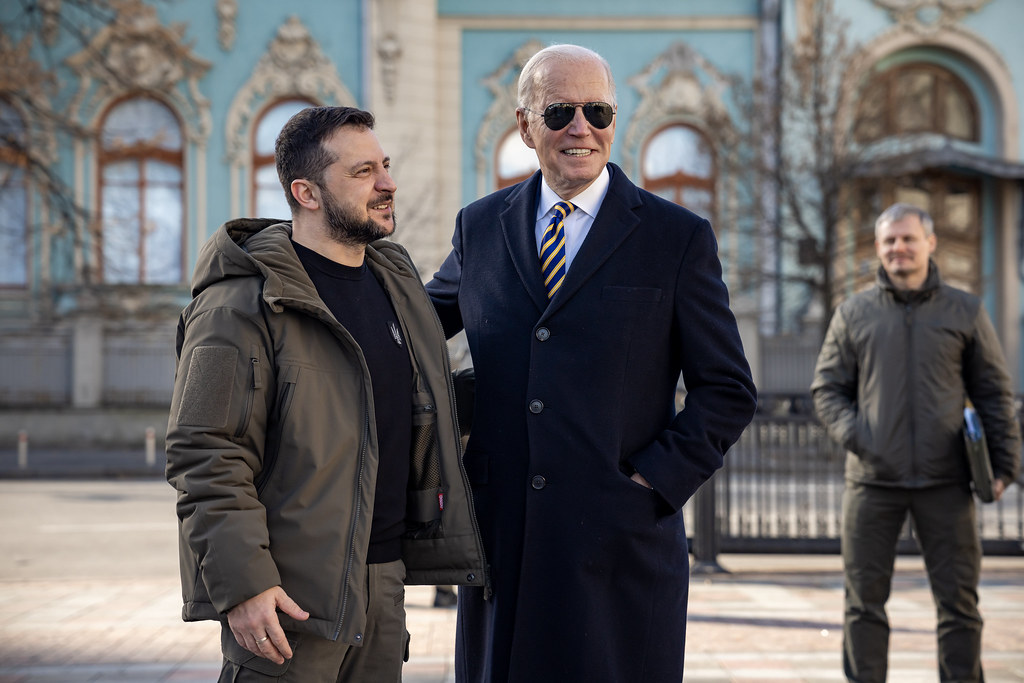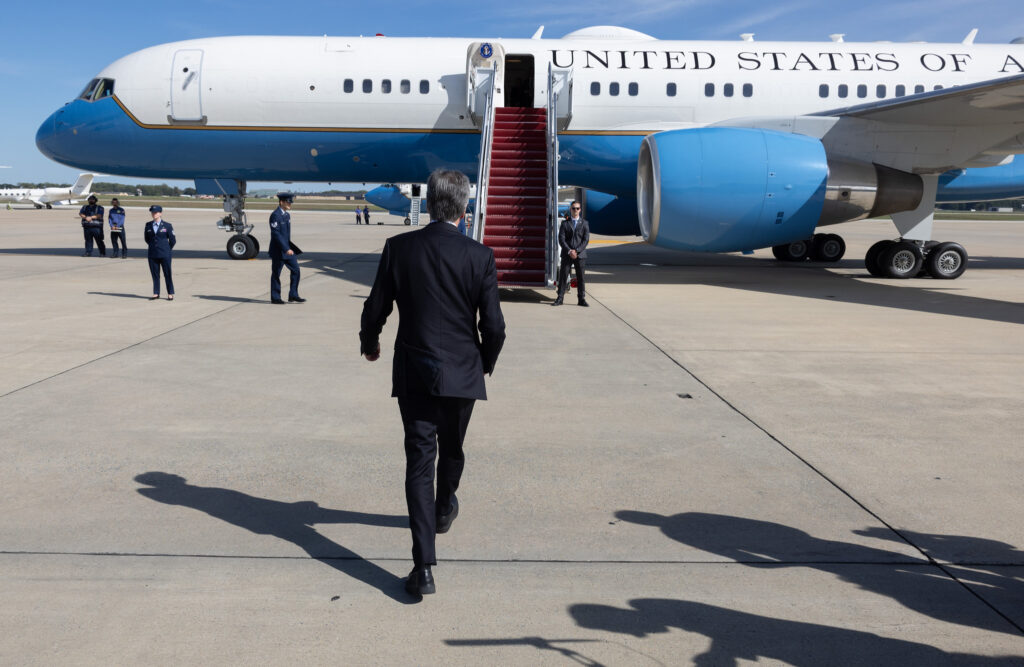President Joe Biden will visit Israel on Wednesday, Oct. 18, U.S. Secretary of State Antony Blinken announced in remarks after nine hours of meetings and negotiations with Israeli Prime Minister Benjamin Netanyahu’s war cabinet.
A presidential visit to an active war zone has a recent precedent: Biden went to Ukraine this past February, on a highly secret visit not revealed until he arrived in Kyiv by train. As the New York Times pointed out, it was the closest an American president had gotten to combat since Abraham Lincoln during the Civil War. Many presidents – including George W. Bush, Barack Obama, and Donald Trump – visited conflict zones, including Iraq and Afghanistan, but in areas controlled by U.S. forces.
This trip will be very different – on many, many levels.
Biden will be going at a time of high uncertainty
Biden will be traveling to Israel at a moment of almost impossible complexity and uncertainty, in military, humanitarian, and political terms.
Although the human suffering is already immense, a principal focus of U.S. and other diplomats is preventing a wider regional war. Biden’s trip to Kyiv reportedly took months of planning, and though it was still very risky, the immediate fears of escalation that arose early in the war had given way to a more grinding conflict. In this case, the conflict is just over a week old and escalation fears are very real. As of this writing, a prime concern is a second front along Israel’s northern border with Lebanon, where Israel is already engaged in fighting with Iran-backed Hezbollah.
Biden was one of multiple leaders who had taken the train to Kyiv, and the trip earlier this year, while undoubtedly important symbolically, produced an aid package that probably could have been announced from Washington. Biden’s visit to Israel, however, could potentially alter the course of escalation, not just through whatever diplomatic breakthrough he or his team may try to achieve, but also as a show of support for Israel. The effects of such a signal on the other outside powers with an interest in this war – especially Iran – are uncertain.
So much of foreign policy is invisible that it is hard to know what messages are being sent ahead of time through back channels. When Biden went to Kyiv, the United States informed Russia, for “deconfliction purposes,” as National Security Advisor Jake Sullivan put it. Still, sending signals in a major international crisis is no easy task.

A second source of uncertainty is on the human level. In Israel, Biden will be threading a needle between comforting citizens and families who have just experienced an attack unlike anything in recent memory, while trying to appeal for restraint to mitigate the severe humanitarian crisis in Gaza.
Israeli citizens are dealing with their shared shock and grief as well as the failure of their vaunted intelligence and security services. On top of that is the hostage crisis, with Israel stating that at least 199 people taken during the Hamas attack are being held in Gaza. As Dani Gilbert explained here at Good Authority last week, this hostage crisis is very different from prior Israeli hostage crises, because there are so many hostages, held in different locations, with no one leader with whom to negotiate. Israel – and indeed even perhaps Hamas leadership – may still not really know how many hostages there are, much less their condition or location. As Dan Drezner has written, in this intense moment Israelis are unlikely to be willing to listen to calls for restraint from the United States – and public calls for restraint could backfire, leaving private channels as the best, but still limited, source of influence Biden may have.
Of course, the Biden administration seeks to wield such influence not only to avoid escalation but also to alleviate the humanitarian crisis in Gaza and prevent further suffering under an Israeli invasion scenario. Many analysts, including Good Authority’s Marc Lynch, have already deemed a ground invasion of Gaza a looming catastrophe, both in humanitarian terms for Palestinians and in strategic terms for Israel.
A third source of uncertainty is the Israeli government itself – as well as Biden’s relationship to it. Biden and Netanyahu have had a tense relationship, and Israel as a policy issue has become increasingly polarized in the United States. Netanyahu is under domestic political pressure unlike anything he has experienced in his previous political lives. A show of support from the United States during a crisis would normally be a win for a leader in Netanyahu’s position, but some Israelis have already seen Biden and his team as more sympathetic than their own government.
Biden will therefore face a series of high-pressure moments during his appearances in Israel, but those public elements will not be the whole story of his visit. We won’t see most of the real action, but that won’t necessarily mean that no action occurred.
Presidents don’t normally make in-person diplomatic visits on the fly
There are many other reasons why this visit represents a departure from presidential practice. Presidential visits are massive logistical and diplomatic undertakings under the most peaceful of circumstances. As research I conducted with James Lebovic on high-level face-to-face diplomacy shows, presidents tend to visit allies and partners regularly, tending to friendships and then relying on those friends in times of crisis. We’ve called this “eat your spinach” diplomacy (so that in the crisis, you can eat the cold pizza).
It is the secretary of state who typically engages in so-called shuttle diplomacy, a term coined when President Nixon’s secretary of state, Henry Kissinger, flew around the Middle East in the aftermath of the 1973 Yom Kippur War. Many have invoked the shocking surprise attack by Israel’s neighbors in the Yom Kippur War as a comparison to the 2023 Hamas attacks, occurring 50 years later.
Presidential time is scarce, even in a major international crisis (leaving aside the fact that Nixon was, in Kissinger’s words, “loaded” during the 1973 war, so much so that Kissinger put off a call for Nixon from the British prime minister). Presidents leave the diplomatic spade work to the diplomats, letting them work out the details so the president can fly in and close the deal with ceremony and symbolism. A visit can be very valuable to the host country as a show of U.S. support or aid – and this was certainly true in Ukraine’s case. High-level leader visits can also provide a boost in public attitudes toward the visiting leader’s country among host country citizens.
But though they are the ultimate decision-makers, presidents don’t typically get in the middle – physically – of diplomatic crises. One of our mental pictures of face-to-face diplomacy is of looking the enemy in the eye, like British Prime Minister Neville Chamberlain flying to meet Hitler in Munich before World War II (and we know how the fruits of that visit turned out) or summitry during the Cold War, such as President Ronald Reagan negotiating directly with Soviet leader Mikhail Gorbachev in Reykjavik in 1986. The other image is that of a peacemaker, as in President Jimmy Carter mediating the peace between Egypt and Israel at Camp David in 1978. But most presidential travel is much less dramatic.

Biden doesn’t have a confirmed ambassador to Israel – but that may be less relevant in this case
Biden will visit Israel at a time when the United States does not have a confirmed ambassador. Given the Hamas attacks, the Senate may confirm Biden’s nominee, former Treasury Secretary Jacob Lew, relatively soon. Multiple Biden nominees for ambassador to several other countries in the region (e.g., Egypt, Oman, and Kuwait) are also awaiting confirmation, and many high-level military appointments are still being blocked by Senator Tommy Tuberville (R-Ala.).
In general, recent research has highlighted the value of ambassadors as “agents” of the president and the perils of ambassadorial vacancies.
But in the specific case of Israel in this crisis, the lack of a confirmed ambassador may be less of an issue. As research by Michael Goldfien has shown, what can matter as much as career diplomatic experience is having the trust of a president. Goldfien’s research focused on political appointees to ambassadorial positions, a practice widely decried for putting inexperienced wealthy donors in important diplomatic posts. Here, nobody is suggesting Lew is an inexperienced political donor, although his nomination generated some opposition from House Republicans who complained about his support for the 2015 Iran nuclear deal and his criticism of Netanyahu.
Regardless, Biden has another person who can step into the role of trusted emissary: Secretary of State Antony Blinken, who has been a Biden adviser for decades. Blinken (who is also highly experienced as a former deputy secretary of state in the Obama administration) has been doing his own shuttle diplomacy in addition to his marathon meeting with Netanyahu’s war cabinet. It’s too soon to know what Blinken’s efforts have yielded. But if they don’t succeed, it will probably not be because of who was or wasn’t conducting U.S. diplomacy on the ground.

In a news conference in Manila during a 2014 trip to Asia, President Obama said of U.S. diplomatic and other foreign policy efforts, “You hit singles, you hit doubles; every once in a while we may be able to hit a home run. But we steadily advance the interests of the American people and our partnership with folks around the world.” That approach has been the presidential norm (well, for most presidents at least). Most diplomatic trips are below-the-radar affairs, and the president is called in as the closer.
Biden’s trip to Israel will not be that kind of trip. He won’t be seeking a grand solution – because there isn’t one within reach – and he will have to try to avoid making a terrible and complex situation worse. There is no blueprint for a wartime presidential visit to diffuse a crisis on this scale.



